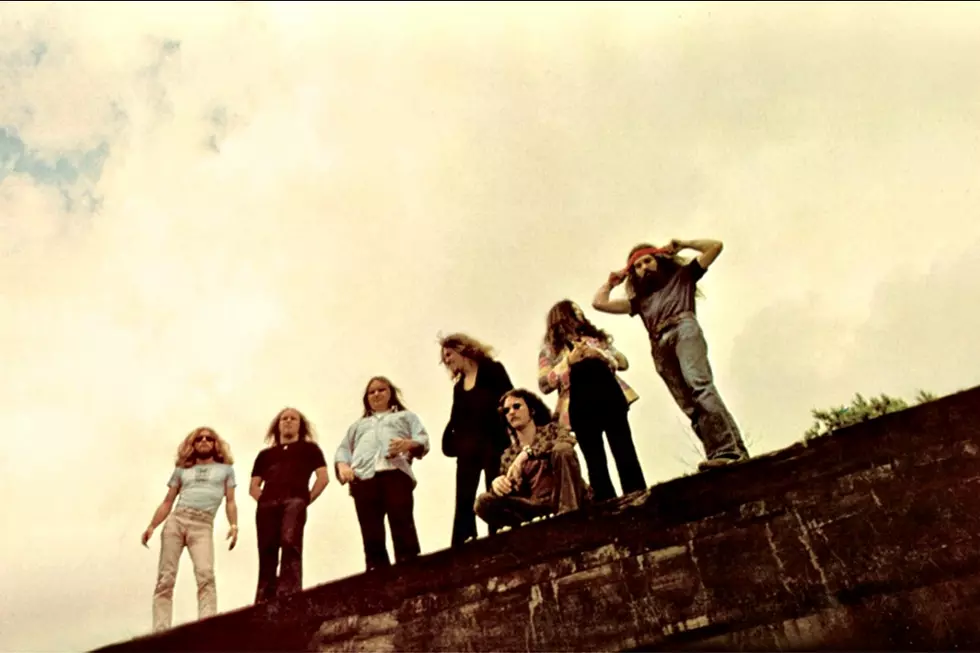
When Lynyrd Skynyrd Headed for Trying Times With ‘Nuthin’ Fancy’
Lynyrd Skynyrd was a band on the rise when they returned to record stores with their third LP — but they were also headed for a period of extreme turbulence. The trouble actually started while they were still in the studio working on Nuthin' Fancy, which arrived in stores on March 24, 1975. Signed and discovered by Al Kooper, who'd produced their first two albums for his Sounds of the South label, the band chafed under Kooper's direction during the Fancy sessions, and ultimately decided to part ways after the record wrapped.
"He tried to tell us what to do, but we wouldn't let him," guitarist Allen Collins told Crawdaddy! in the summer of 1975. "He once brought up this idea to do a Grand Funk-like song. We said we didn't do that shit. There's good and bad parts to everybody. I'm not saying anything against him, but we ain't gonna use him anymore."
The Nuthin' Fancy mix proved a particular sticking point for the band, who elected guitarist Ed King to undo Kooper's work. But King was having his own issues with Skynyrd — as was drummer Bob Burns, who left the lineup weeks prior to the group returning to the studio to work on the LP. New drummer Artimus Pyle entered the ranks just in time to join them for the quick 17-day recording process that produced the album — and just a few months before King walked out in the middle of the tour, partly prompted by changes that started taking place after manager Peter Rudge took over in Kooper's absence.
"Ronnie was drinking a lot. It was just an unpleasant situation," King later told Classic Bands. "I never drank, but I was into drugs pretty good. I had gotten fed up with frankly all the violence. Our new manager used to tell [singer] Ronnie [Van Zant], 'Hey, the crazier you are, the better you're gonna be.' And I think he kind of took it to heart. It just got a little too nutty for me. So, in the middle of the night, I just walked out."
In the midst of all this chaos, Lynyrd Skynyrd delivered a remarkably strong set of songs. Nuthin' Fancy became their first album to break the Billboard Top 10, peaking at No. 9 on the Top 200 Albums chart and bringing them a Top 40 single with the No. 27 hit "Saturday Night Special."
Summing up the depth and breadth of Skynyrd's music in five minutes, "Saturday Night Special" followed the same rough outline that any casual listener would have expected from the band, with its riff-heavy three-guitar attack bolstering Van Zant's distinctive southern howl. But lyrically, it's far more than just a stereotypical redneck rocker, with verse after verse describing the ruin wrought by the impulsive violence enabled by cheap handguns that "Ain't no good for nothin' / But put a man six feet in a hole" and asking, "Why don't we dump 'em, people / To the bottom of the sea."
"Saturday Night Special" still remains a sticking point for gun enthusiasts who continue to accuse the band of selling out — or those who see Skynyrd's tangled relationship with the Confederate flag as an example of how they're willing to pander to the God-and-guns crowd just as quickly as they'll talk down to them.
Listen to Lynyrd Skynyrd Perform 'Saturday Night Special'
Van Zant, who co-wrote the track with King, never shied away from speaking to his own experiences in song, presenting a picture of Southern life that was more varied and complex than any stereotype.
"I think of the group as a team," explained guitarist Gary Rossington. "Ronnie, Ed, Allen and myself are the basic core of the band. If I quit, it wouldn't hurt that much. Same with Al and Ed. But if Ronnie quit, it would fall apart – he holds everything together. I think he's one of the best writers in America. He just writes true stories. Decisions are made jointly by the four of us, but he has always made the final decision 'cause he was a little older and smarter than the rest of us."
"We went in there and they said, 'Don't you know the bass and drums are supposed to play together?' We didn't even know how to count time to songs – we had just two speeds: slow and fast," Van Zant admitted of the band's early '70s Muscle Shoals sessions, which would eventually see release as Skynyrd's First and ... Last in 1978. "I don't understand this phrase 'I've paid my dues.' We didn't have any money and lived on peanut butter and jelly, and I loved it. I don't regret any of it. We never expected to make it this far, but we worked hard to get here. The money doesn't mean shit: I really don't care about it at all."
As Nuthin' Fancy soared up the charts, Skynyrd's image — and its internal band dynamic — may have been clouded by booze, violence and music business politics, but Van Zant insisted that underneath it all, it was still all about honest rock 'n' roll. "All I'm concerned with is the chance to play concerts like we're doin' now. We could even stand to come down a few notches – I'd like to see everybody who wants to see us get in," he continued. "I don't care what the promoter says, I don't care what the writers say. I just care about those people out there who paid to see us."
Sadly, a horrific plane crash changed Lynyrd Skynyrd forever in a couple years, when Van Zant, guitarist Steve Gaines and vocalist Cassie Gaines, as well as assistant road manager Dean Kilpatrick, pilot Walter McCreary and co-pilot William Gray were killed on impact. But on their occasionally rocky road to the top, the band remained a brotherhood in spite of any defections or disagreements.
"We haven't changed, even though some people's attitudes have changed towards us," Rossington said, though he admitted the band's touring schedule wasn't always as much fun as it might appear from the outside. "We'd like to start writing a lot more and touring less. For four years we've been constantly on the road, never at home."
Top 25 Southern Rock Albums
You Think You Know Lynyrd Skynyrd?
More From WWMJ Ellsworth Maine










